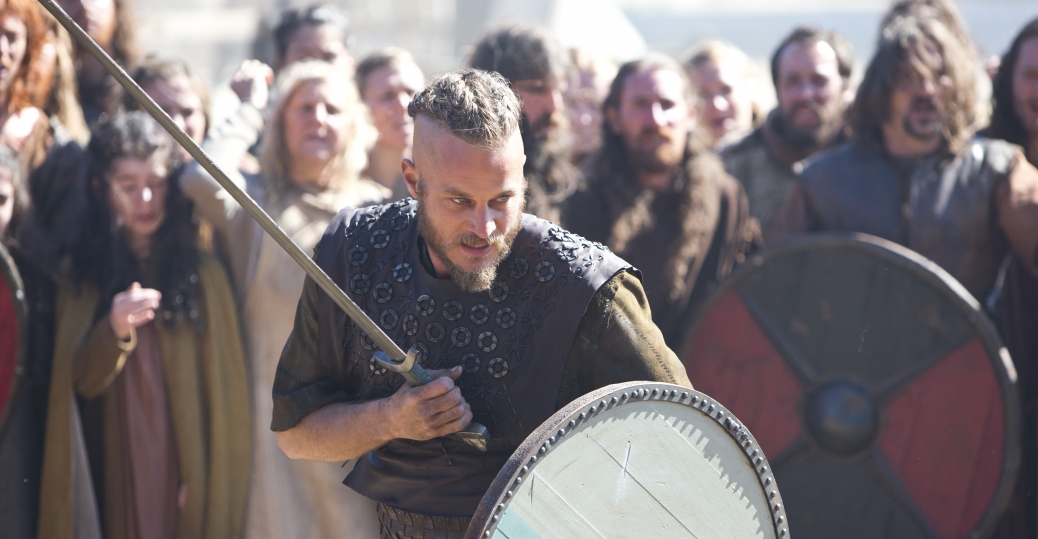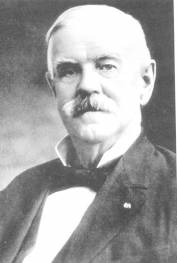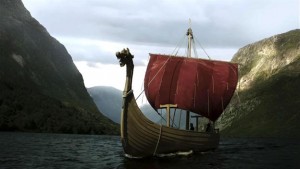
The History Channel’s “Vikings” dramatizes the various sagas, chronicles, and skaldic poems about the Viking raider Ragnar Lodbrok into a weekly television show. It’s also the History Channel’s first scripted drama. In one way it’s a dramatic departure from the conspiracy theory “documentaries” and reality television that currently dominate the History Channel’s lineup. But “Vikings” is also a return to the the roots of the History Channel, essentially a full length version of the dramatizations that take place between the informational programming about actual historical fact.
Like all good works of fiction, “Vikings” reveals some truths about our own conditions. Here’s how those truths apply to Rhode Island politics. Note: TONS OF SPOILERS AHEAD
1. A vision is necessary to win success, even if that vision defies convention. Innovation will occur to reach that vision. The first episode deals with Ragnar (Travis Fimmel) taking the initiative and sailing west. His liege, Earl Haraldson (Gabriel Byrne) has the Vikings raiding east, winning very little from the impoverished Baltic tribes. Ragnar secretly organizes an expedition west, picking up a few inventions along the way; a rudimentary compass to remain at the right latitude, a sunstone to figure out where the sun is during overcast days, and a longboat that can not only travel over the ocean but also upriver. The expedition lands at Lindisfarne in England and nets itself a tidy profit.
Rhode Island lacks that vision. Like Earl Haraldson, we’re content to work with what we know and in a conventional manner, even though its failure is pretty plain to see. Without that vision, don’t expect innovation to crop up any time soon.
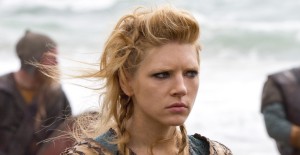
2. Just because it’s a man’s world doesn’t mean women aren’t going to kick ass. Ragnar’s wife Lagertha (Katheryn Winnick) isn’t your typical mom with two kids. In the first episode she drives off two would-be rapists with an red-hot piece of iron and a meathook. Later on, she joins Ragnar in another raid on England, joining in the shieldwall that defeats a few Anglo-Saxon forces. There’s a couple other women who appear as extras in the background of most battle scenes as well. Later on, Lagertha does a great job mediating disputes while Ragnar is away in England.
Women in Rhode Island politics are kicking ass everyday. We’ve got Gina Raimondo, Elizabeth Roberts and Teresa Paiva Weed in positions of power, while clearly Donna Nesselbush just did a bang up job of getting marriage equality through the Senate. On the House side you’ve got Maria Cimini and Teresa Tanzi on the progressive wing, and no one can say the Tea Party’s Doreen Costa is a wilting lily. Yes, no woman has ever been Governor or represented Rhode Island in the U.S. Senate. Just proves there’s more asses left to kick. Sadly, a woman’s work is never done. Lagertha might well agree.
3. Religion plays a major role, and woe to those who forget that. There’s almost never an episode that goes by in “Vikings” without at least a minute or two devoted to talking about the Norse pantheon in some manner, including a weird reenactment of Ragnarok. Viking characters routinely wonder if Odin has forsaken them. Similarly, the court of Northumbria is divided about whether the vikings are a scourge sent by God to punish the Saxons for not being pious enough or a plague sent by the devil. They won’t agree to a peace until one of the vikings converts.
Whether it’s a prayer banner, Christmas tree, or it’s marriage equality, Rhode Island’s wars of religion are just as passionate as about any that appear on television (though less bloody). Death threats, mockery of God, and proselytizing about our “values” are all part of Rhode Island’s political debates. Religious figures consistently weigh in on the gamut issues. Religion plays a major part in our lives, whether we want it to or not.
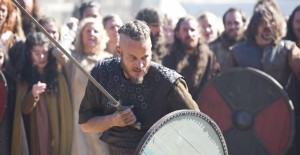
4. If you take on leadership, you better win. About midway through the episodes so far, Ragnar challenges Earl Haraldson directly for power. It’s not an unexpected turn of events, since they’ve been more or less on a collision course from the opening moments. Haraldson moves quickly to knock out Ragnar, raiding Ragnar’s homestead, capturing his brother, and wounds Ragnar as well. Desperate and in hiding, Ragnar takes a gamble and challenges Haraldson to single combat. And in about the time of the average General Assembly session, Ragnar is Earl and Haraldson is off to dine in Valhalla.
Though Rhode Island politics has recently been devoid of the sudden overthrows that used to characterize succession from one leadership team to the other, we’ve seen plenty of people fail to succeed with such attempts. State legislators who too openly criticize leadership find themselves as isolated as Ragnar finds himself, but unfortunately they don’t get single combat as an option to solve their problems.
5. Just because you’re opposed to someone, doesn’t mean you can’t share a meal. Following his victory over Haraldson, Ragnar returns to Northumbria to get some more gold. As he goes raiding, he runs into King Aelle (Ivan Kaye) who’s determined to stop the vikings from taking his people’s stuff. After a disastrous defeat at the hands of Ragnar, Aelle eventually arranges a dinner to discuss terms of a truce and despite the deplorable manners of the vikings during the saying of grace and the meal itself, Ragnar and Aelle are able to share some lighthearted moments.
Rhode Island politics are often too small to carry on vitriolic grudges, and it’s the rare politician who won’t attend drinks, even if it’s with the other side. That’s the thing, even though there are strong stances and vehement positions, it’s the worst of us who aren’t willing to see the other side as human beings. The best of us accept our differences as the cost of living together.
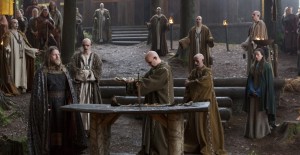
6. There’s always another position to get to. Ragnar is just a lowly fisherman who does part-time raiding at the beginning of the series. By the most recent episode, he’s an Earl, and now he’s working with King Horik of Denmark (played by Donal Logue). Whether his ambitions will make him vie for the kingship is unknown, but Danish history of the time often shows there were multiple kings in Denmark, and viking adventurers weren’t adverse to carving out kingships for themselves (a number of Danes ruled over England).
In Rhode Island politics, no matter how high you rise, you’re still in Rhode Island, which means there’s always another place to go for. Some of the most extreme examples of Raimondomania are discussions of her inhabiting the White House. But that kind of overblown expectation isn’t confined to Raimondo; some observers talked of Lincoln Chafee, Sheldon Whitehouse, and Jack Reed taking three of President Obama’s cabinet positions. All of them remain in place. It’s a reminder that even though the battles in Rhode Island are fierce, they fit into a larger environment. Just like Ragnar’s ambitions.
In all honesty, I don’t think there are any lessons about Rhode Island politics that aren’t self-evident. This is more me geeking out over Vikings, which recently wrapped its series on Sunday. Its last five episodes can be watched online.

